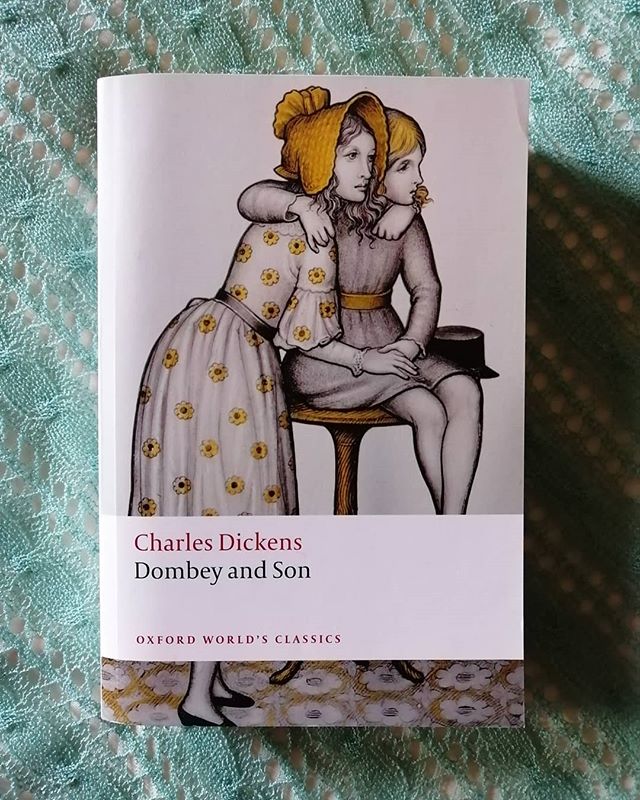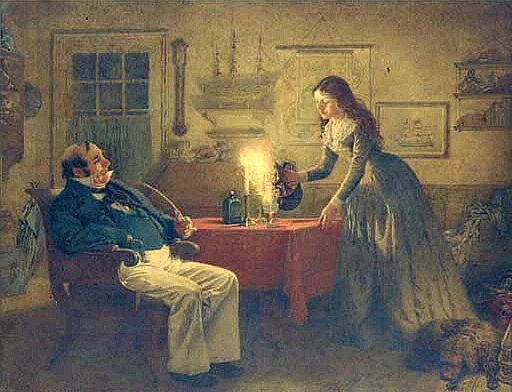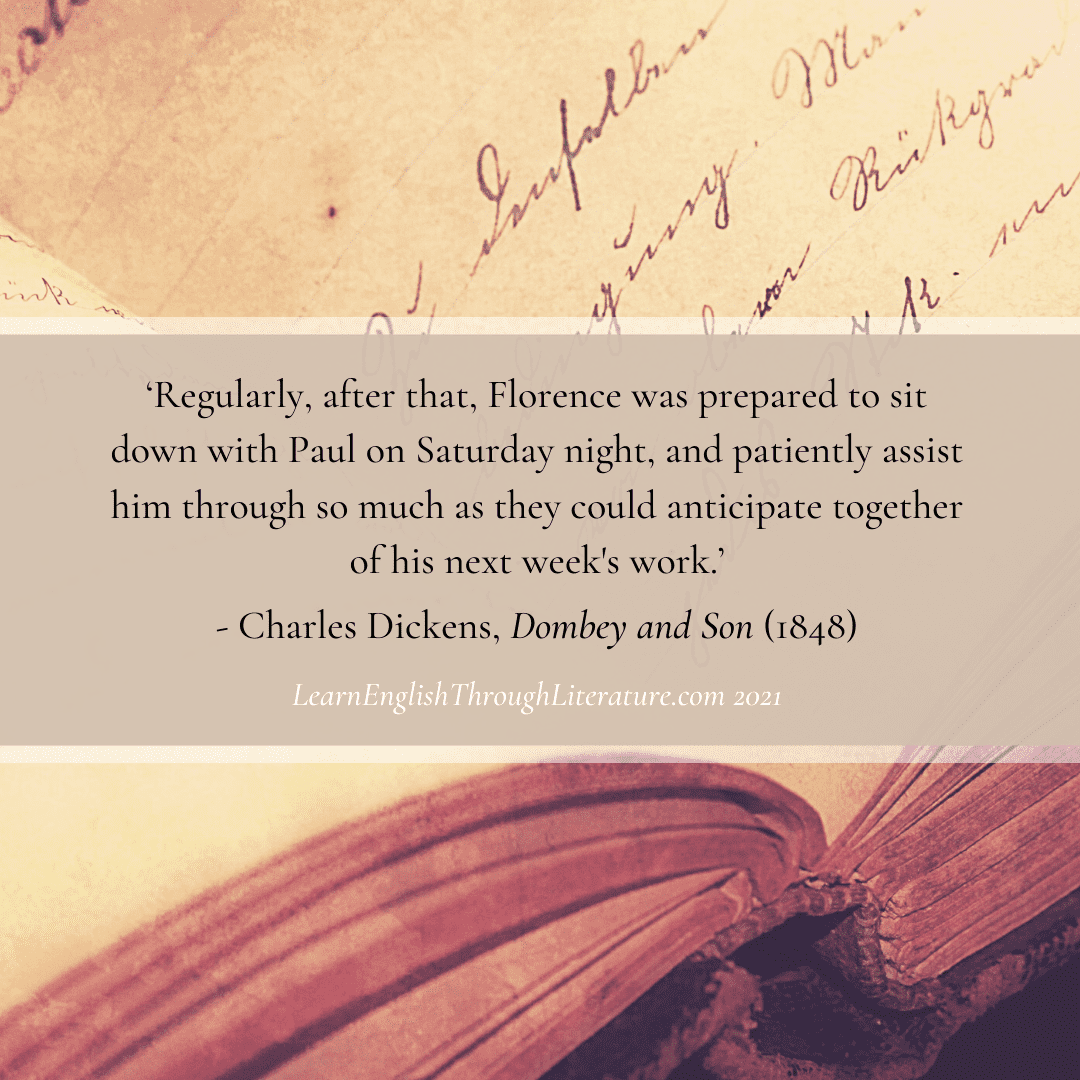If you have been following my Lessons over the past couple of weeks, you will have seen that we are looking at the most common or typical mistakes that students make when learning English, with a special focus on how different mother tongues influence your English studies. In Lesson #267 we looked at the common mistakes that French speakers make, while in Lesson #268 we looked at common mistakes Russian speakers make.
In today’s Lesson, we will look at about 20 common errors Italian speakers fall into when they speak or write in English.
👉 This Lesson isn’t restricted to Italian speakers only, however. You should find something helpful here regardless of your first language.
As I have mentioned before, please don’t feel this list as a judgment or criticism of your shortcomings as English language students. Learning languages is hard, so I want to help you quickly identify anything that helps you improve right now! 💡
As I considered these common mistakes, Charles Dickens’ Dombey and Son (1848) came to mind as offering suitable examples and a memorable novel for us to study.

📘 BACKGROUND TO DOMBEY AND SON
Dombey and Son (1848) was Charles Dickens’ breakthrough novel when he first published it in serial format from 1846-1848. It was his first immediate bestseller and changed the course of his career as a self-supporting writer.
🕯️ It is also significant as a novel for introducing its readers to new social and familial issues in its time: the issue of one-parent homes, parent-child relationships, happy marriages, and even separations.
It tells the story of a wealthy businessman called Mr Dombey, whose dying wife gives birth to a longed-for (dearly wanted) son, Paul. Mr Dombey already has a daughter called Florence who is about six years old at the start of the novel. She dotes on (is very fond of) her little brother Paul and they become very close, all the more so since Mr Dombey is a cold, distant, and very formal father. He is proud of his son and expects him to grow up to inherit the family business called ‘Dombey and Son’, but disregards Florence since as a daughter she will not become a part of the firm.
The novel follows the life and adventures of the Dombeys and the friends that they make: some plain and trustworthy, others cunning (clever in a dangerous way, always planning out of self-interest). Dickens does an excellent job of interweaving the life stories of very different characters and portraying them in a convincing (believable) manner. Through the character of strong, long-suffering women such as Florence and her step-mother, Dickens demonstrates how family love and personal humility are ultimately key (essential) to fulfilling a happy family life.

Now that you have an overview of this wonderful novel, let’s make a list of mistakes to look out for (with the help of Charles Dickens)!
…
COMMON MISTAKES ITALIANS TEND TO MAKE
📝 #1 ‘YOU ARE WELCOME/MY PLEASURE’ vs ‘NOTHING’
✍️ When someone says, ‘thank you’, do not answer ‘nothing’ which is a translation of ‘di niente’ in Italian.
You can answer with ‘you’re welcome’ or ‘my pleasure’. In familiar situations, you could also say, ‘it’s nothing’.
📘 “You are very kind,” said Florence. “Thank you, it’s of no consequence,” retorted Mr Toots.
– Charles Dickens, Dombey and Son
…
📝 #2 ‘DO’ vs ‘MAKE’
Another mistake arises from not fully understanding the difference between ‘do’ and ‘make’, words that in Italian are summed up in a single word: ‘fare’.
This is a general issue for students who have Romance mother languages, as you may have noticed in Lesson #267 where we looked at trouble spots for French students of English.
✍️ In English, we use ‘do’ when talking about activities :✒️ e.g., ‘I do exercise’, ‘You do yoga’, ‘He does photography’, etc.
✍️ On the other hand, we use ‘make’ when there is a sense of creation in the activity: ✒️e.g., ‘I made a cake’, ‘we made a mistake’, ‘she makes her own clothes’, ‘they made breakfast for us’, etc.
📘 “Polly, my gal,” said Mr Toodle, with a young Toodle on each knee, and two more making tea for him, and plenty more scattered about—Mr Toodle was never out of children, but always kept a good supply on hand—”you ain’t seen our Biler lately, have you?”
– Charles Dickens, Dombey and Son (emphasis mine)
…
📝 #3 AVOID USING DOUBLE NEGATIVES IN ENGLISH
In Italian it is perfectly acceptable and normal practice to use double negatives in a sentence, such as ‘Non ho fatto niente’.
✍️ However, we avoid double negatives in English, since in the few instances where they are used (usually in more archaic or older English) they will actually cancel each other out and turn into a positive: ‘… worthy to have not remained so long unsung’ (John Milton, Paradise Regain’d, Book 1). This kind of language is poetic and complex, so we hardly use it in everyday speech.
If you use this kind of language, most people won’t always know whether to take you literally (and turn your double negatives into a ‘poetic positive’) or to interpret your double negatives as a single emphatic negative (your intention, but still a mistake in English).
So to follow up on our example above, the correct way to express ‘non ho fatto niente’ in English would be to say ‘we didn’t do anything’.
In these excerpts from the novel below, notice how the word ‘anything’ (rather than ‘nothing’) is used with negative words such as ‘not’ or ‘without’:
📘 “Well, child!” said Mrs Chick, after a pause, “I wouldn’t on any account say anything unkind to you …”
– Charles Dickens, Dombey and Son (emphasis mine)
📘 ‘… the friendly thing for him to do would be, without saying anything about it to Walter at present, just to step up to Mr Dombey’s house …’
– Charles Dickens, Dombey and Son (emphasis mine)
…
📝 #4 ALWAYS INCLUDE SUBJECT PRONOUNS
Subject pronouns are necessary in English – always!
This point refers to a habit many Italian speakers have of leaving out the subject pronouns of a sentence because in Italian, the subject is already identified by the verb form.
For example, ‘Faccio’ doesn’t really need to be expressed as ‘Io faccio’ for it to make sense.
✍️ By contrast, in English we do need subject pronouns (or even the nouns themselves) to show who is doing or receiving the verb’s action.
📘 ‘Florence lives alone in the great dreary house, and day succeeded day, and still she lived alone …’
– Charles Dickens, Dombey and Son (emphases mine)
…
📝 #5 ‘PARENTS’ VS ‘RELATIVES / WIDER FAMILY’
Please remember that in English the word ‘parents’ does not translate as the Italian ‘parenti’.
The correct translation of ‘parents’ (e.g., a father and mother) is ‘genitori’ in Italian.
The Italian word ‘parenti’ refers to what English speakers call ‘family members’, ‘wider family’, or to use an older English word, ‘kindred’. Consequently, you cannot say ‘all my parents’ ❌ because ‘all’ refers to at least three people here and we only ever have two parents. The correct expression here would be ‘both my parents’.
📘 ‘Mr Tozer, now a young man of lofty stature, in Wellington boots, was so extremely full of antiquity as to be nearly on a par with a genuine ancient Roman in his knowledge of English: a triumph that affected his good parents with the tenderest emotions …’
– Charles Dickens, Dombey and Son (emphases mine)
…
📝 #6 THE WORD ‘REASONMENT’ DOES NOT EXIST IN ENGLISH
‘Ragionamento’ should be translated as ‘reasoning’, not ‘reasonment’ (a word that doesn’t exist in English). Such a mistake comes from translating too literally and, while English speakers will understand what you mean if you use ‘reasonment’, it is not a correct word.
✍️ Instead, please use ‘reasoning’ when you want to describe a ‘logical process or direction of thinking’.
📘 ‘Mrs Chick, after forging this powerful chain of reasoning, remains silent for a minute to admire it.’
– Charles Dickens, Dombey and Son (emphasis mine)
…
📝 #7 ‘AFTER’ vs ‘LATER’
This is a tricky issue indeed! In Italian, one word ‘dopo’ tends to be used for the two English words ‘after’ and ‘later’.
✍️ However, ‘after’ in English refers to something that is happening immediately after a stated or suggested event: for example, ‘I have to go to a lecture, but I will talk more with you after …’ This sentence shows that the speaker wants to meet the other person right immediately after the lecture ends. We often specify what ‘after’ is referring to, or we might use ‘afterwards’ in the same context:
✒️ ‘… I will talk more with you after the lecture’, or
✒️ ‘… I will talk more with you afterwards’.
✍️ On the other hand, ‘later’ is more general and vague. Take our example above: ‘I have to go to a lecture right now, but I will talk more with you later …’ This word ‘later’ can refer to the whole afternoon/evening/day/week/month/year following the lecture’s end: it is non-specific.
📘 ‘Richards … now entered curtseying, but without the baby; Paul being asleep after the fatigues of the morning.’
– Charles Dickens, Dombey and Son (emphasis mine)
📘 ‘”Of course,” said Mr Dombey; and sat looking at one page for an hour afterwards, without reading one word.’
– Charles Dickens, Dombey and Son (emphasis mine)
📘 ‘… his hopes were set upon a later stage of his existence.’
– Charles Dickens, Dombey and Son (emphasis mine)
…
📝 #8 ‘ANTICIPATE’ (ENGLISH) IS NOT THE SAME AS ‘ANTICIPARE’ (ITALIAN)
Anticipate is not the Italian ‘anticipare’, which refers to moving something ahead of schedule, the opposite of ‘postpone’.
✍️ Rather, the English ‘anticipate’ is closer to the Italian word ‘aspettare’, having a sense of expectation and even planning for something that you know will happen.
Notice how Dickens uses it here when he describes little Florence helping her brother to prepare for the schoolwork that they ‘anticipate’ he will have to do over the coming week:
📘 ‘Regularly, after that, Florence was prepared to sit down with Paul on Saturday night, and patiently assist him through so much as they could anticipate together of his next week’s work.’
– Charles Dickens, Dombey and Son (emphasis mine)
…
📝 #9 ‘FUNNY’ IS NOT THE ADJECTIVE FORM OF ‘FUN’
As mentioned in Lesson #267 (mistake number #16), ‘funny’ is often mistakenly used as an adjective meaning ‘lots of fun’.
✍️ However, ‘funny’ actually means something amusing, humorous, comic, indeed anything likely to make you laugh. In Italian you might use the word ‘buffo’ to express this.
✍️ On the other hand, ‘fun’ refers to entertainment, pleasure, and attractive excitement: ‘il divertimento’ in Italian.
The similarity is understandably confusing for anyone learning English, so just try to remember these differences.
Since ‘funny’ is a more modern word, Charles Dickens used words like ‘amusing’, ‘comic’, or ‘humorous’ to describe the same idea. Notice how he uses ‘humorous’ here:
📘 ‘Cousin Feenix and the young lady were very lively and humorous, and the young lady laughed so much at something Cousin Feenix related to her …’
– Charles Dickens, Dombey and Son (emphasis mine)
…
📝 #10 ‘WASTING TIME’ (ENGLISH) vs ‘LOSING TIME’ (LITERAL ITALIAN TRANSLATION)
📘 “I am wasting time, and there is none to spare; yet if I hadn’t thought of all, I shouldn’t be here now.”
– Charles Dickens, Dombey and Son (emphasis mine)
✍️ In English, we sometimes talk about ‘wasting time’, which as an Italian expression is ‘perdere tempo’ (literally, ‘lose time’). Once again, try not to translate literally but use the English expression – ‘to waste time’.
…
👉 There are some 10 more mistakes worth noting, so please join me in Part 2 of this Lesson to learn how to avoid them!




